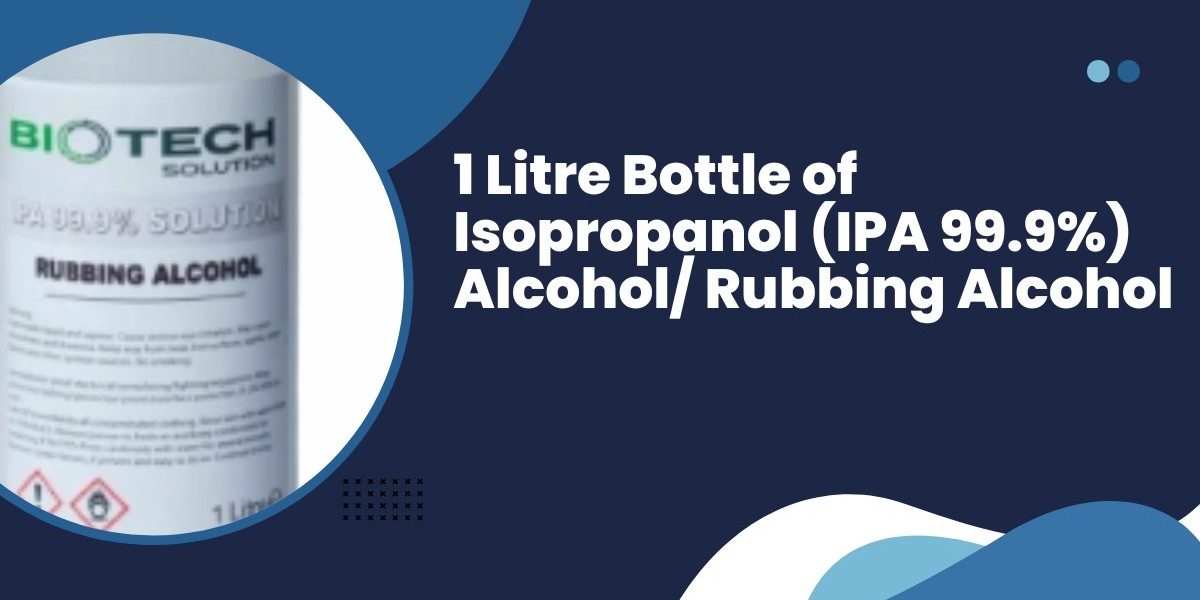Isopropyl alcohol is a staple in households, industries, and medical settings, renowned for its potent cleaning and disinfecting properties. From sanitizing surfaces to removing stubborn stains, this chemical compound is invaluable for daily tasks and specialized applications. But what makes it so effective, and why is it so widely used? In this article, we delve into the properties, uses, and benefits of isopropyl alcohol, offering a clear understanding of its importance in various fields.
What is Isopropyl Alcohol?
Isopropyl alcohol, commonly known as rubbing alcohol, is a colorless, flammable liquid with a strong odor. Its chemical formula, C₃H₈O, indicates its classification as an alcohol. Unlike ethanol, isopropyl alcohol is synthesized for industrial and household use rather than consumption.
Properties of Isopropyl Alcohol
- Antiseptic: Kills bacteria and viruses effectively.
- Volatile: Evaporates quickly, leaving no residue.
- Solvent: Breaks down oils, adhesives, and other substances.
- Miscible with Water: Can be diluted for varied concentrations.
How is Isopropyl Alcohol Produced?
Manufacturing isopropyl alcohol involves combining water and propene, a byproduct of petroleum refining, through a process called hydration. This method ensures high purity, making it suitable for medical and industrial applications.
Common Uses of Isopropyl Alcohol
1. Medical Applications
- Wound Cleaning: Used to clean minor cuts and scrapes to prevent infection.
- Sanitizing Tools: Essential in sterilizing surgical instruments.
- Hand Sanitizers: Forms the base of most alcohol-based sanitizers.
2. Household Cleaning
- Surface Disinfection: Effective on countertops, doorknobs, and appliances.
- Stain Removal: Dissolves ink, oil, and grease marks.
- Glass Cleaner: Leaves windows and mirrors streak-free.
3. Industrial Uses
- Electronics Maintenance: Removes dust and debris from circuit boards.
- Automotive Cleaning: Cleans windshields and headlights.
- Paint Thinner: Helps in preparing surfaces for painting.
4. Beauty and Personal Care
- Makeup Brush Cleaning: Dissolves makeup residues.
- Nail Polish Remover: Acts as an alternative to acetone.
- Haircare Products: Found in certain shampoos and toners.
Safety Tips for Using Isopropyl Alcohol
- Avoid Inhalation: Use in well-ventilated areas.
- Store Properly: Keep away from heat and open flames.
- Dilute When Necessary: Follow guidelines for proper concentration levels.
- Keep Away from Children: Ensure safe storage to avoid accidental ingestion.
Comparison - Isopropyl Alcohol vs. Ethanol
| Feature | Isopropyl Alcohol | Ethanol |
|---|---|---|
| Use | Disinfection, cleaning | Disinfection, beverages |
| Evaporation Rate | Faster | Slower |
| Odor | Strong | Mild |
| Cost | Affordable | Relatively higher |
Key Benefits of Isopropyl Alcohol
- Versatility: Applicable in medical, household, and industrial settings.
- Effectiveness: Eliminates 99% of bacteria and viruses.
- Economical: Affordable and widely available.
Isopropyl Alcohol in COVID-19 Times
The global pandemic highlighted the significance of isopropyl alcohol. Its role in sanitizing hands, surfaces, and personal protective equipment (PPE) was unparalleled, making it a critical resource in combating virus spread.
Environmental Considerations
While isopropyl alcohol is biodegradable, its improper disposal can harm ecosystems. Always follow local guidelines to minimize environmental impact.
How to Choose the Right Concentration of Isopropyl Alcohol
- 70% Solution: Ideal for disinfection as it penetrates bacterial membranes effectively.
- 99% Solution: Suitable for cleaning electronics and removing stubborn residues.
Quotes on the Importance of Disinfection
"Cleanliness and hygiene are the foundations of a healthy life. Products like isopropyl alcohol play a pivotal role in achieving this goal." – Dr. James Peterson, Public Health Expert.
Interesting Facts About Isopropyl Alcohol
- It was first developed in 1920 by Standard Oil.
- Commonly used in the production of hand sanitizers during emergencies.
- Featured in first aid kits worldwide.
FAQs
What are the side effects of using isopropyl alcohol?
Prolonged exposure can cause skin irritation or dryness. Avoid inhaling fumes or applying it to large skin areas.
Can isopropyl alcohol be used on electronics?
Yes, it is safe for cleaning electronics as it evaporates quickly without damaging components.
What is the difference between rubbing alcohol and isopropyl alcohol?
Rubbing alcohol is a diluted solution of isopropyl alcohol, often mixed with water and other additives.
How long does it take for isopropyl alcohol to kill germs?
Most germs are eliminated within 30 seconds to a minute of application.
Is isopropyl alcohol safe for pets?
No, it can be toxic to animals if ingested or inhaled in large amounts.
Can isopropyl alcohol remove permanent marker stains?
Yes, its solvent properties make it effective for breaking down and removing ink stains.
Conclusion
Isopropyl alcohol is a versatile, cost-effective solution for cleaning, disinfecting, and beyond. Its unmatched efficacy makes it a household essential and a key player in medical and industrial fields. Whether you're looking to sanitize your home, maintain electronics, or stay prepared for emergencies, understanding the uses and precautions of isopropyl alcohol can make all the difference.



